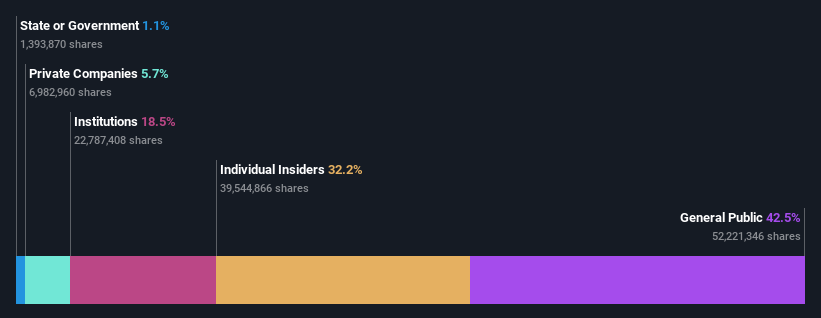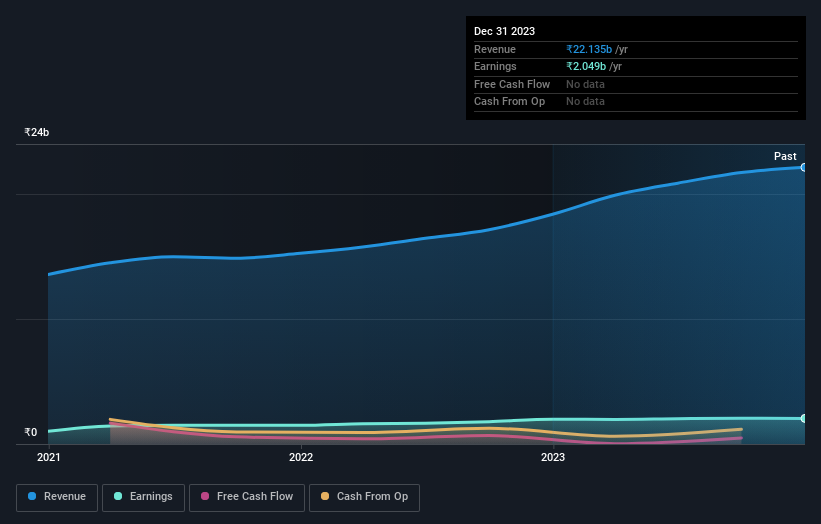Stock Analysis
- India
- /
- Commercial Services
- /
- NSEI:IONEXCHANG
Ion Exchange (India) Limited's (NSE:IONEXCHANG) last week's 7.4% decline must have disappointed retail investors who have a significant stake

Key Insights
- Significant control over Ion Exchange (India) by retail investors implies that the general public has more power to influence management and governance-related decisions
- The top 16 shareholders own 50% of the company
- Insiders have sold recently
If you want to know who really controls Ion Exchange (India) Limited (NSE:IONEXCHANG), then you'll have to look at the makeup of its share registry. The group holding the most number of shares in the company, around 42% to be precise, is retail investors. Put another way, the group faces the maximum upside potential (or downside risk).
While the holdings of retail investors took a hit after last week’s 7.4% price drop, insiders with their 32% also suffered.
Let's delve deeper into each type of owner of Ion Exchange (India), beginning with the chart below.
Check out our latest analysis for Ion Exchange (India)

What Does The Institutional Ownership Tell Us About Ion Exchange (India)?
Institutional investors commonly compare their own returns to the returns of a commonly followed index. So they generally do consider buying larger companies that are included in the relevant benchmark index.
Ion Exchange (India) already has institutions on the share registry. Indeed, they own a respectable stake in the company. This implies the analysts working for those institutions have looked at the stock and they like it. But just like anyone else, they could be wrong. If multiple institutions change their view on a stock at the same time, you could see the share price drop fast. It's therefore worth looking at Ion Exchange (India)'s earnings history below. Of course, the future is what really matters.

Hedge funds don't have many shares in Ion Exchange (India). Because actions speak louder than words, we consider it a good sign when insiders own a significant stake in a company. In Ion Exchange (India)'s case, its Top Key Executive, Rajesh Sharma, is the largest shareholder, holding 7.6% of shares outstanding. The second and third largest shareholders are Mahabir Patni and Nippon Life India Asset Management Limited, with an equal amount of shares to their name at 5.9%.
After doing some more digging, we found that the top 16 have the combined ownership of 50% in the company, suggesting that no single shareholder has significant control over the company.
Researching institutional ownership is a good way to gauge and filter a stock's expected performance. The same can be achieved by studying analyst sentiments. We're not picking up on any analyst coverage of the stock at the moment, so the company is unlikely to be widely held.
Insider Ownership Of Ion Exchange (India)
The definition of company insiders can be subjective and does vary between jurisdictions. Our data reflects individual insiders, capturing board members at the very least. Management ultimately answers to the board. However, it is not uncommon for managers to be executive board members, especially if they are a founder or the CEO.
Insider ownership is positive when it signals leadership are thinking like the true owners of the company. However, high insider ownership can also give immense power to a small group within the company. This can be negative in some circumstances.
It seems insiders own a significant proportion of Ion Exchange (India) Limited. It has a market capitalization of just ₹55b, and insiders have ₹18b worth of shares in their own names. We would say this shows alignment with shareholders, but it is worth noting that the company is still quite small; some insiders may have founded the business. You can click here to see if those insiders have been buying or selling.
General Public Ownership
The general public-- including retail investors -- own 42% stake in the company, and hence can't easily be ignored. While this size of ownership may not be enough to sway a policy decision in their favour, they can still make a collective impact on company policies.
Private Company Ownership
Our data indicates that Private Companies hold 5.7%, of the company's shares. It might be worth looking deeper into this. If related parties, such as insiders, have an interest in one of these private companies, that should be disclosed in the annual report. Private companies may also have a strategic interest in the company.
Next Steps:
While it is well worth considering the different groups that own a company, there are other factors that are even more important. To that end, you should be aware of the 1 warning sign we've spotted with Ion Exchange (India) .
If you would prefer check out another company -- one with potentially superior financials -- then do not miss this free list of interesting companies, backed by strong financial data.
NB: Figures in this article are calculated using data from the last twelve months, which refer to the 12-month period ending on the last date of the month the financial statement is dated. This may not be consistent with full year annual report figures.
Valuation is complex, but we're helping make it simple.
Find out whether Ion Exchange (India) is potentially over or undervalued by checking out our comprehensive analysis, which includes fair value estimates, risks and warnings, dividends, insider transactions and financial health.
View the Free AnalysisHave feedback on this article? Concerned about the content? Get in touch with us directly. Alternatively, email editorial-team (at) simplywallst.com.
This article by Simply Wall St is general in nature. We provide commentary based on historical data and analyst forecasts only using an unbiased methodology and our articles are not intended to be financial advice. It does not constitute a recommendation to buy or sell any stock, and does not take account of your objectives, or your financial situation. We aim to bring you long-term focused analysis driven by fundamental data. Note that our analysis may not factor in the latest price-sensitive company announcements or qualitative material. Simply Wall St has no position in any stocks mentioned.
About NSEI:IONEXCHANG
Ion Exchange (India)
Ion Exchange (India) Limited, together with its subsidiaries, provides water treatment and environment management solutions in India and internationally.
Flawless balance sheet average dividend payer.

